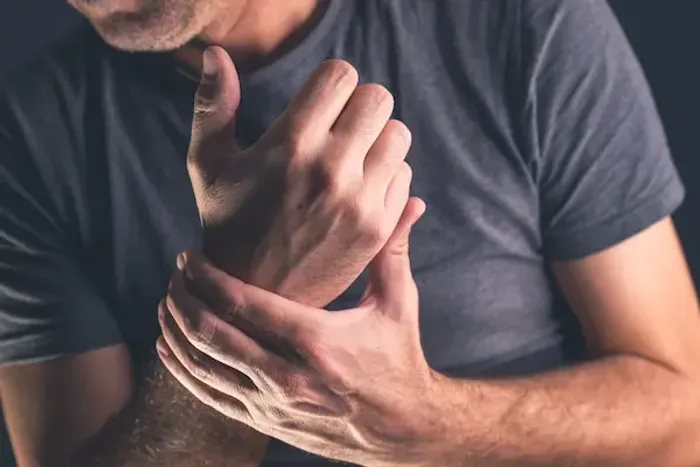Paresthesia: Definition and Overview
Understand Paresthesia: Discover its definition, common causes like nerve compression and underlying conditions, and the characteristic symptoms of tingling, numbness, or prickling sensations. Get an overview of this widespread neurological phenomenon.

Written by Dr. M L Ezhilarasan
Reviewed by Dr. Rohinipriyanka Pondugula MBBS
Last updated on 19th Aug, 2025

Have you ever experienced a sudden tingling, numbness, or "pins and needles" sensation in your hands, feet, or other body parts? This strange feeling is called paresthesia, and while it’s usually harmless, it can sometimes signal an underlying health issue. Let’s explore what paresthesia is, why it happens, and how you can manage it.
What Is Paresthesia?
Paresthesia refers to an abnormal sensation in the body, often described as:
- Tingling
- Numbness
- Burning
- Prickling
- "Pins and needles"
These sensations can occur anywhere but are most common in the hands, arms, legs, and feet. Paresthesia can be temporary (acute) or longlasting (chronic).
Temporary vs. Chronic Paresthesia
- 1. Temporary Paresthesia – Often caused by pressure on a nerve (like sitting crosslegged or sleeping on your arm). It usually goes away quickly once you change position.
- 2. Chronic Paresthesia – Lasts longer and may indicate an underlying medical condition, such as diabetes, nerve damage, or vitamin deficiencies.
What Causes Paresthesia?
Several factors can lead to paresthesia, including:
1. Nerve Compression or Injury
- Carpal Tunnel Syndrome – Pressure on the median nerve in the wrist, causing hand numbness.
- Pinched Nerve – Often due to poor posture, herniated discs, or repetitive motions.
2. Poor Blood Circulation
- Sitting or standing in one position for too long can reduce blood flow, leading to tingling.
3. Physicianal Deficiencies
- Lack of vitamin B12, magnesium, or potassium can affect nerve function.
4. Chronic Health Conditions
- Diabetes (can cause nerve damage called diabetic neuropathy)
- Multiple Sclerosis (MS) (affects the nervous system)
- Thyroid Disorders
5. Infections or Autoimmune Diseases
- Lyme disease, shingles, or HIV can cause nerve-related symptoms.
6. Medications or Toxins
- Some chemotherapy drugs, antibiotics, or heavy alcohol use may trigger paresthesia.
Symptoms to Watch For
While occasional tingling is normal, seek medical advice if you experience:
- Persistent numbness or weakness
- Pain along with tingling
- Difficulty moving the affected limb
- Symptoms spreading to other body parts
- Bladder or bowel control issues (a medical emergency)
How Is Paresthesia Diagnosed?
If your symptoms are frequent or severe, a doctor may recommend:
- Nerve conduction studies (to check nerve function)
- Blood tests (for diabetes, vitamin deficiencies, or thyroid issues)
- MRI or CT scans (to detect nerve compression or spinal problems)
:Consult Top Physician For Personalised Tips
Managing and Preventing Paresthesia
Managing and preventing paresthesia:
1. Lifestyle Changes
- Improve Posture – Avoid slouching or sitting in positions that compress nerves.
- Take Breaks – If you work at a desk, stand up and stretch regularly.
- Exercise – Activities like yoga or walking improve circulation.
2. Dietary Adjustments
- Eat foods rich in B vitamins (meat, eggs, leafy greens), magnesium (nuts, seeds), and potassium (bananas, sweet potatoes).
- Stay hydrated to support nerve function.
3. Home Remedies
- Warm compresses can relax muscles and improve blood flow.
- Massage the affected area gently to stimulate nerves.
4. Medical Treatments
- Physical therapy for nerve compression.
- Medications (pain relievers, antiinflammatory drugs, or supplements for deficiencies).
- Surgery (in severe cases like carpal tunnel syndrome).
When to See a Doctor?
If paresthesia interferes with daily life or comes with other concerning symptoms, consult a healthcare professional. Early diagnosis can prevent complications like permanent nerve damage.
Need Help? Book a Consultation Today!
If you're experiencing persistent tingling or numbness, don’t ignore it. Schedule a consultation with a neurologist or general physician through Apollo 24|7 for expert advice and diagnostic tests.
Final Thoughts
Paresthesia is usually harmless, but chronic cases need attention. Simple lifestyle changes, a balanced diet, and timely medical care can help manage symptoms effectively. Listen to your body—if something feels off, seek help to stay healthy and pain free!
Would you like to speak with a specialist? Visit Apollo 24|7 to book an appointment today. Stay informed, stay healthy!
Consult Top Physician
Consult Top Physician

Dr Aakash Andgi
General Physician/ Internal Medicine Specialist
9 Years • MBBS MD
Bengaluru
Apollo Clinic, JP nagar, Bengaluru

Dr. Anand Ravi
General Physician
2 Years • MBBS
Bengaluru
PRESTIGE SHANTHINIKETAN - SOCIETY CLINIC, Bengaluru

Dr Syed Mateen Pasha
General Physician
2 Years • MBBS
Bengaluru
PRESTIGE SHANTHINIKETAN - SOCIETY CLINIC, Bengaluru

Dr. Shubham Chauhan
General Practitioner
4 Years • MBBS
Lucknow
Apollo 24|7 Clinic - Uttar Pradesh, Lucknow

Dr. Harshendra Jaiswal
General Physician/ Internal Medicine Specialist
12 Years • MBBS , MD (General medicine)
Kolkata
108 DHANA DHANVANTARI Clinic, Kolkata
(25+ Patients)




